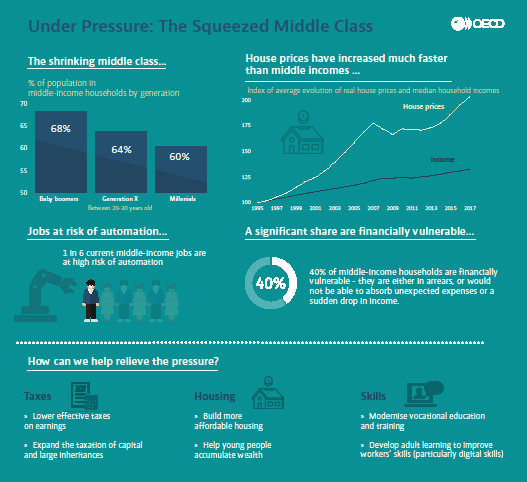The political trends in Europe are worrying. Rising populist or nationalist parties overshadow the mainstream parties and thus endanger the European construction. As I already explained in a number of posts, in my opinion, the primary cause of the situation is economy-related.
The mechanism which made economic prosperity for the European citizens after WWII and the emergence of a middle class possible is broken. Capitalism (actually the capital owners) seems to have become very self-centered, a shift also prompted by the absence of a competing system, such as communism which put forward a different economic model. However utopic or abusive, it did offer a benchmark for social equity. Capitalism was under pressure to prove its superiority and appeal, and the most convincing way to achieve that was to develop a sizeable middle class. A quite successful endeavor. But now that goal is no longer a priority and it is not by chance that polls show the European youth increasingly drifting towards left-wing ideas.
Globalization and capital relocation have halted the growth of the middle class in developed countries and allowed polarization and frustration to build up. Frustration found its expression in people changing, sometimes radically, their political options. Brexit, the rise of the Italian populists or of the German far right, the dwindling popularity of the EU and its institutions are all symptoms of the more or less silent uprising against the destruction of the agreement between Capital and Labor after the WWII.
This is why Labor is now back with a vengeance by voting mainly for anti-establishment, i.e. anti-Capital, parties. This is why the only way for the European leaders to manage and stabilize the political system by deradicalizing the public is to rebuild the middle class and shield it against Capital.
This is, however, nowhere in sight. A recent report published by the OECD shows that the middle class (defined as households earning between 75% and 200% of the median national income) is shrinking compared to its size before the crisis. Middle incomes in member countries have stalled, with an increase in the past decade of just 0.3% per year, while the income of the rich has grown by 10%.

Moreover, the cost of living for the middle class has increased faster than inflation. House prices are a good example as they have been growing three times faster than the middle income.
The latest rallies in Germany demanding housing at an affordable price are a perfect illustration of the rich countries crisis and rising social polarization. More than one third of a German household income goes towards mortgage, utilities and home maintenance costs. The record high rents in the largest German cities have made people be outspoken about nationalizing the living spaces offered by major real estate companies.
The OECD report estimates that households need to spend 10 years paying off a 60 m2 apartment in the capital city of a member state. In the mid-80s, six years would have been enough. This makes it impossible for a household to qualify as middle class without two incomes.
Prospects are not encouraging given that digitalization will continue to drive the wedge even deeper into the society by making it easier to replace unskilled workers, and by also dislodging a portion (1 in 6 acc. to the OECD) of the professionals still making up the middle class. On the other hand, owners of either financial capital or scarce capital-related know-how will thrive and get even more disconnected from the rest of the world.
Under these circumstances rebuilding the middle class is a tall order which must be accomplished as otherwise, political developments may take us to surprising or even destabilizing outcomes.
The answer lies in people`s ability to keep reinventing themselves over their lifetimes, in politicians` making a clean break from the financial elites to create a resilient middle class. Political slogans will simply not do and a lack of leadership in Europe will only make matters worse.
Have a nice weekend!
Subscribe to receive notifications when new articles are published
